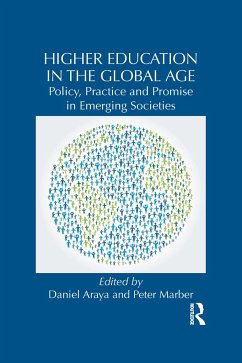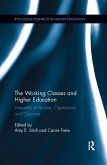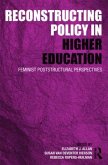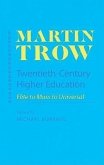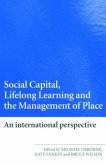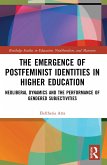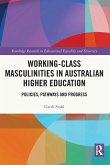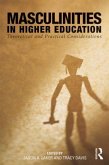Higher Education in the Global Age
Policy, Practice and Promise in Emerging Societies
Herausgeber: Araya, Daniel; Marber, Peter
Higher Education in the Global Age
Policy, Practice and Promise in Emerging Societies
Herausgeber: Araya, Daniel; Marber, Peter
- Broschiertes Buch
- Merkliste
- Auf die Merkliste
- Bewerten Bewerten
- Teilen
- Produkt teilen
- Produkterinnerung
- Produkterinnerung
In the last few decades, many of the most classless societies in the global South have become increasingly polarized between the world's richest and poorest citizens. This edited volume focuses on the rapid growth of emerging economies in the context of globalization and education, examining how universities are contributing to these trends, and outlining the role that higher education should play in a globalizing world.
Andere Kunden interessierten sich auch für
![The Working Classes and Higher Education The Working Classes and Higher Education]() The Working Classes and Higher Education59,99 €
The Working Classes and Higher Education59,99 €![Reconstructing Policy in Higher Education Reconstructing Policy in Higher Education]() Reconstructing Policy in Higher Education75,99 €
Reconstructing Policy in Higher Education75,99 €![Twentieth-Century Higher Education Twentieth-Century Higher Education]() Martin TrowTwentieth-Century Higher Education48,99 €
Martin TrowTwentieth-Century Higher Education48,99 €![Social Capital, Lifelong Learning and the Management of Place Social Capital, Lifelong Learning and the Management of Place]() Mike Osborne / Kate Sankey / Bruce Wilson (eds.)Social Capital, Lifelong Learning and the Management of Place67,99 €
Mike Osborne / Kate Sankey / Bruce Wilson (eds.)Social Capital, Lifelong Learning and the Management of Place67,99 €![The Emergence of Postfeminist Identities in Higher Education The Emergence of Postfeminist Identities in Higher Education]() Eleftheria AttaThe Emergence of Postfeminist Identities in Higher Education53,99 €
Eleftheria AttaThe Emergence of Postfeminist Identities in Higher Education53,99 €![Working-Class Masculinities in Australian Higher Education Working-Class Masculinities in Australian Higher Education]() Garth StahlWorking-Class Masculinities in Australian Higher Education57,99 €
Garth StahlWorking-Class Masculinities in Australian Higher Education57,99 €![Masculinities in Higher Education Masculinities in Higher Education]() Masculinities in Higher Education67,99 €
Masculinities in Higher Education67,99 €-
-
-
In the last few decades, many of the most classless societies in the global South have become increasingly polarized between the world's richest and poorest citizens. This edited volume focuses on the rapid growth of emerging economies in the context of globalization and education, examining how universities are contributing to these trends, and outlining the role that higher education should play in a globalizing world.
Produktdetails
- Produktdetails
- Verlag: Taylor & Francis Ltd (Sales)
- Seitenzahl: 352
- Erscheinungstermin: 8. September 2015
- Englisch
- Abmessung: 229mm x 152mm x 19mm
- Gewicht: 490g
- ISBN-13: 9781138952300
- ISBN-10: 1138952303
- Artikelnr.: 42904306
- Verlag: Taylor & Francis Ltd (Sales)
- Seitenzahl: 352
- Erscheinungstermin: 8. September 2015
- Englisch
- Abmessung: 229mm x 152mm x 19mm
- Gewicht: 490g
- ISBN-13: 9781138952300
- ISBN-10: 1138952303
- Artikelnr.: 42904306
Daniel Araya is a Research Fellow at the Institute for Computing in the Humanities, Arts and Social Sciences at the National Center for Supercomputing Applications. He is also a Research Associate with the Digital Media and Learning Research Hub at the University of California, and a Research Affiliate with the Martin Prosperity Institute at the University of Toronto. His newest books include: Smart Cities as Democratic Ecologies (2014, Palgrave), Higher Education in the Global Age (with Peter Marber) (2013, Routledge), and Education in the Creative Economy (with Michael A. Peters) (2010, Peter Lang). He has a Ph.D. from the University of Illinois at Urbana-Champaign and is an alumnus of Singularity University's graduate program at the NASA Research Park in Silicon Valley. Peter Marber is a professional money manager, writer and teacher specializing in globalization and emerging markets. He has held senior positions at some of the world's largest banks and financial institutions since 1987, and has taught at Columbia University since 1993. An author of more than 100 articles and columns on global topics, Marber's first book, From Third World to World Class: The Future of Emerging Markets in the Global Economy, was named "future reference reading for the 24/7 Global Marketplace" by Wired. David Brooks of the New York Times called his second book, Money Changes Everything: How Global Prosperity is Reshaping Our Needs, Values, and Lifestyles, "an outstanding primer on the awesome social effects of globalization." His third book, Seeing the Elephant: Understanding Globalization from Trunk to Tail, was published in 2009. His next book is titled Brave New Math: Information, Globalization and the Need for New Policy Thinking. He serves on various boards for Columbia University, New America Foundation, World Policy Institute, and the Emerging Markets Trade Association.
Foreword: The Future of Global Education Parag Khanna Introduction: Higher
Education in the Global Age Daniel Araya and Peter Marber Section One:
Mapping Higher Education 1. Higher Education and Emerging Markets:
Opportunity, Anxiety and Unintended Consequences Amid Globalization Peter
Marber 2. Why Should We Care About Global Higher Education? Ben Wildavsky
3. Bologna Trionfante?: The Global Influence of Europe's Higher Education
Agenda Paul L. Gaston 4. Higher Education Competition and Regional Networks
in Russia and Central Eurasia Mark Johnson 5. Emerging Higher Education in
the Post-Confucian Heritage Zone Simon Marginson 6. The China Conundrum
Tom Bartlett and Karin Fischer 7. Privatisation and Policy Shifts: The
Changing Nature of Private Education Provision in India Judith Guy 8.
Inside African Private Higher Education Louise Morley 9. Globalising and
Regionalising Higher Education in Latin America: Locating Brazil in
Multiscalar Projects and Politics Alfredo M. Gomes, Susan L. Robertson and
Roger Dale 10. Will For-Profit Universities Solve the Access Problem in
Mexican Higher Education? Normando Bezerra, Claudia Massei, Nils
Schulze-Halberg and Tyler Stypinski Section Two: Policy, Practice and
Promise 11. Towards Post-Industrial Education: State Capitalism and China
Daniel Araya 12. Educating for the Creative Economy in Emerging Countries:
Challenges and Strategies Corrine van Beilen and Greg Hearn 13. Can Oil
Generate Creativity? A Look at Qatar and the United Arab Emirates Kevin
Stolarick and Loulia Kouchaji 14. Striving for "World Class Excellence":
Rankings and Emerging Societies Ellen Hazelkorn 15. Anchoring Effects in
World University Rankings: Exploring Biases in Reputation Scores Nicholas
A. Bowman and Michael N. Bastedo 16. The Role of Tuition Fees in the Spread
of Higher Education Around the Globe Jennifer A. Delaney and Patricia Yu
17. A Buyers' Guide to Branch Campuses? Alan Ruby and Adriana Jaramillo
Education in the Global Age Daniel Araya and Peter Marber Section One:
Mapping Higher Education 1. Higher Education and Emerging Markets:
Opportunity, Anxiety and Unintended Consequences Amid Globalization Peter
Marber 2. Why Should We Care About Global Higher Education? Ben Wildavsky
3. Bologna Trionfante?: The Global Influence of Europe's Higher Education
Agenda Paul L. Gaston 4. Higher Education Competition and Regional Networks
in Russia and Central Eurasia Mark Johnson 5. Emerging Higher Education in
the Post-Confucian Heritage Zone Simon Marginson 6. The China Conundrum
Tom Bartlett and Karin Fischer 7. Privatisation and Policy Shifts: The
Changing Nature of Private Education Provision in India Judith Guy 8.
Inside African Private Higher Education Louise Morley 9. Globalising and
Regionalising Higher Education in Latin America: Locating Brazil in
Multiscalar Projects and Politics Alfredo M. Gomes, Susan L. Robertson and
Roger Dale 10. Will For-Profit Universities Solve the Access Problem in
Mexican Higher Education? Normando Bezerra, Claudia Massei, Nils
Schulze-Halberg and Tyler Stypinski Section Two: Policy, Practice and
Promise 11. Towards Post-Industrial Education: State Capitalism and China
Daniel Araya 12. Educating for the Creative Economy in Emerging Countries:
Challenges and Strategies Corrine van Beilen and Greg Hearn 13. Can Oil
Generate Creativity? A Look at Qatar and the United Arab Emirates Kevin
Stolarick and Loulia Kouchaji 14. Striving for "World Class Excellence":
Rankings and Emerging Societies Ellen Hazelkorn 15. Anchoring Effects in
World University Rankings: Exploring Biases in Reputation Scores Nicholas
A. Bowman and Michael N. Bastedo 16. The Role of Tuition Fees in the Spread
of Higher Education Around the Globe Jennifer A. Delaney and Patricia Yu
17. A Buyers' Guide to Branch Campuses? Alan Ruby and Adriana Jaramillo
Foreword: The Future of Global Education Parag Khanna Introduction: Higher
Education in the Global Age Daniel Araya and Peter Marber Section One:
Mapping Higher Education 1. Higher Education and Emerging Markets:
Opportunity, Anxiety and Unintended Consequences Amid Globalization Peter
Marber 2. Why Should We Care About Global Higher Education? Ben Wildavsky
3. Bologna Trionfante?: The Global Influence of Europe's Higher Education
Agenda Paul L. Gaston 4. Higher Education Competition and Regional Networks
in Russia and Central Eurasia Mark Johnson 5. Emerging Higher Education in
the Post-Confucian Heritage Zone Simon Marginson 6. The China Conundrum
Tom Bartlett and Karin Fischer 7. Privatisation and Policy Shifts: The
Changing Nature of Private Education Provision in India Judith Guy 8.
Inside African Private Higher Education Louise Morley 9. Globalising and
Regionalising Higher Education in Latin America: Locating Brazil in
Multiscalar Projects and Politics Alfredo M. Gomes, Susan L. Robertson and
Roger Dale 10. Will For-Profit Universities Solve the Access Problem in
Mexican Higher Education? Normando Bezerra, Claudia Massei, Nils
Schulze-Halberg and Tyler Stypinski Section Two: Policy, Practice and
Promise 11. Towards Post-Industrial Education: State Capitalism and China
Daniel Araya 12. Educating for the Creative Economy in Emerging Countries:
Challenges and Strategies Corrine van Beilen and Greg Hearn 13. Can Oil
Generate Creativity? A Look at Qatar and the United Arab Emirates Kevin
Stolarick and Loulia Kouchaji 14. Striving for "World Class Excellence":
Rankings and Emerging Societies Ellen Hazelkorn 15. Anchoring Effects in
World University Rankings: Exploring Biases in Reputation Scores Nicholas
A. Bowman and Michael N. Bastedo 16. The Role of Tuition Fees in the Spread
of Higher Education Around the Globe Jennifer A. Delaney and Patricia Yu
17. A Buyers' Guide to Branch Campuses? Alan Ruby and Adriana Jaramillo
Education in the Global Age Daniel Araya and Peter Marber Section One:
Mapping Higher Education 1. Higher Education and Emerging Markets:
Opportunity, Anxiety and Unintended Consequences Amid Globalization Peter
Marber 2. Why Should We Care About Global Higher Education? Ben Wildavsky
3. Bologna Trionfante?: The Global Influence of Europe's Higher Education
Agenda Paul L. Gaston 4. Higher Education Competition and Regional Networks
in Russia and Central Eurasia Mark Johnson 5. Emerging Higher Education in
the Post-Confucian Heritage Zone Simon Marginson 6. The China Conundrum
Tom Bartlett and Karin Fischer 7. Privatisation and Policy Shifts: The
Changing Nature of Private Education Provision in India Judith Guy 8.
Inside African Private Higher Education Louise Morley 9. Globalising and
Regionalising Higher Education in Latin America: Locating Brazil in
Multiscalar Projects and Politics Alfredo M. Gomes, Susan L. Robertson and
Roger Dale 10. Will For-Profit Universities Solve the Access Problem in
Mexican Higher Education? Normando Bezerra, Claudia Massei, Nils
Schulze-Halberg and Tyler Stypinski Section Two: Policy, Practice and
Promise 11. Towards Post-Industrial Education: State Capitalism and China
Daniel Araya 12. Educating for the Creative Economy in Emerging Countries:
Challenges and Strategies Corrine van Beilen and Greg Hearn 13. Can Oil
Generate Creativity? A Look at Qatar and the United Arab Emirates Kevin
Stolarick and Loulia Kouchaji 14. Striving for "World Class Excellence":
Rankings and Emerging Societies Ellen Hazelkorn 15. Anchoring Effects in
World University Rankings: Exploring Biases in Reputation Scores Nicholas
A. Bowman and Michael N. Bastedo 16. The Role of Tuition Fees in the Spread
of Higher Education Around the Globe Jennifer A. Delaney and Patricia Yu
17. A Buyers' Guide to Branch Campuses? Alan Ruby and Adriana Jaramillo

